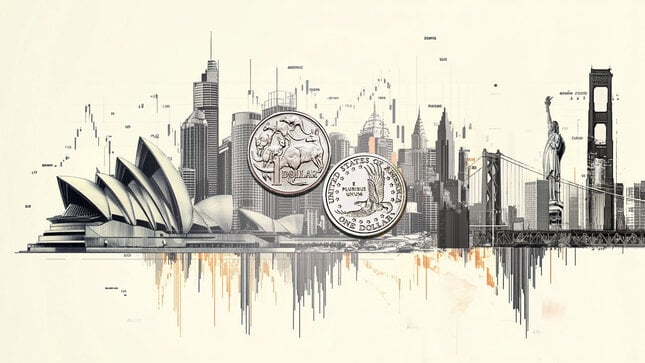Few things are as static as money and at the same time evoke such strong emotions (greed, power, fear, etc etc). How is that possible and what can we do to see for it really is (a medium of exchange)?
The problem is our behaviour. We do dumb things like buying high and selling low or choosing a stock that delivers a solid return - while paying twice that in interest on credit card debt.
A lot of financial advice is very straightforward and super easy ("earn more, spend less."). Just like most dieting advice ("eat less, exercise more") and we just don't do it...
"Financial success is more about behaviour than it is about skill.”
I'll be discussing both financial planning and trade planning in the article below, because the approach is very similar.
Let's get to it...
What does money mean to you?
This is the first and most important question to ask yourself. Does it mean greed? Security? Freedom? Opportunity? Power? Or something else? The importance of figuring this is out is that the rest of your plan depends on what money means to you. So you need to dig deep and get an idea of what your true goals are and which risks and changes you are willing to take on.
Most people hear the term Financial Planning or Trading Plan and they either run away or fall asleep (I'm part of the latter group). If only someone else could tell me what to do. But that can't work, because someone else - especially someone I could hire for this - doesn't know what money means to me, which risks I want to take and what I'm willing to change. All these things are highly personal, because they involve our lives and our life goals.
So for instance, trading is not about making a living or creating a retirement; it's about your vision of making a living or your vision of your retirement. What sounds like a great retirement vision for me, might be nothing short of living hell for someone else.
And it's exactly the same in a trading plan. Know how you want to trade, which risks you want to take and which changes you are willing to make in your trading to reach that state.
So - for both - let's ditch the ABC plans and go for custom tailored.
It's not like your plan has to be written out and be clear as day. It can even change. All you need is to know in which direction you want to take it. This will keep you from chasing hyped up things, like that last hyped up investment or in your trading that currency pair or stock that keeps on going up. You chase, you die.
Knowing in which direction you want to take your plan is done by creating 3 big goals. So for your financial planning this is for instance retiring in X years or making sure your kids can go to university in X years or buying a house in X years, etc.
For your trading plan it can be to have a win % of +60% by the end of the year or growing your account by X this year, etc.
No one can predict the future and run away from people who claim they can predict it
Before we look into planning and how to plan further, let's talk about a reason why we need a plan. It's because we can't predict the future, because if we could, who needs a plan that goes any further than going all-in on the right stock?
Timing is always the issue (but not the issue you should be trying to figure out). You don't want to know how often I get this message from beginning traders: "I can read the market really well, I just need to work on my timing. It seems like every time I get it, it's too early or too late, but never on time."
This is because of how our minds work. It's no coincidence that bubbles happen. It's because timing is always a key element (but as we know from the way we use price action, it's the element that is build from all the different tools and elements that we use and then suddenly it is not about timing any more, but about risk management).
Back in the day people said internet stocks are the best stocks, they just keep going up - and then 2000 happened. Then they said, buying a home was a surefire bet - and then 2008 hit hard. Ouch! But do you see the pattern there?
Trying to predict the future based on the performance of the past. It's like trying to predict a coin toss based on the fact that the last toss was tails. The last toss is no guarantee.
No investment will last forever and no stock or currency will always go up and up and further up.
So you need to use very good principles and tools to base your decisions on. And yes, as I mentioned before, you need a plan.
Now we know why it's important to have a plan, let's dig into behaviour and feelings.
Money and trading makes us feel things and feelings create behaviour. And that's a dangerous thing...sometimes.
We chase trades because it feels safe to follow everyone else. We invest in stocks, because they keep on going up, because everyone keeps on investing in them...until they don't.
We get a trade in, because we feel we should as traders. Of course this is only if we don't hold onto our trading principles, but note how many people let go of their trading principles too often, because...<insert excuse of the day>...
When letting go of the trading principles we are gambling. Exciting, entertaining, fun...and dangerous!
Base your investment and trading decisions on your principles (and goals!) and not on the feeling of playing a game.
Good behaviour = Feelings < Habits
The best way to not let your behaviour be influenced by your feelings is to not make dumb decisions. But that seems to be the problem.
So we need to make sure our feelings can't interfere our behaviour. Habits are the answer here. If you are on auto pilot when analysing your investment or trade opportunity and you know your principles will always keep you out a bad call, you are going to be fine (in the long run).
It takes about 66 days before something becomes a habit. So before this auto pilot can work, you need to put in a conscious effort to make all of these principles a habit.
The Overnight Test
Very often you start to doubt whether the investment you made or the trade you are in, is still good. A good way to think about this is to do the Overnight Test.
This means that you imagine that last night all these investments/trades magically disappeared and you are not in this investment or trade. And then you determine if you would take the investment right now or in the case of the trade, you analyse if you would get into the trade now if a entry would present itself. And if the answer is no, why not? And is that a good reason? Does all of that still line up with your financial planning goals/plan or you trading plan/goals?
Some basic rules about investing and trading
1. Pay down debt.
2. Pay down debt. Seriously.
Paying off debt with high interest rates is always a better investment than pretty much anything else you can think of. Ask anyone who earns from your high interest rates. People who understand interest earn it. People who don’t pay it.
3. Don't invest/trade with money you can't miss. You (and your family who may depend on you) can't do without food and a roof above your head. You can do without that 3rd Ferrari.
4. If you are struggling to be profitable in your trading and you're struggling to understand why, there is one word that will help you forward: Focus.
Narrow your attention down to one trade at a time and learn from each trade as much as you can. Trading is a process in which your emotions bounce all over the place and even just one trade will be enough to keep your mind busy and focused, and wear you out eventually.
This is also related to the next point.
5. Don't take on more risk than necessary. Trading and investing is about protecting your account/capital. Don't take on more risk at any given moment than necessary.
Risk 2%-5% per trade of your total account size.
Don't invest half of your capital in one investment.
6. Study one big investment at a time and then take it on.
Navin goes into more detail on this in the Money Management course.
Don't look at the news too much
Ok, we know there are news events and they can influence our trade or even our investment. But let's make sure we don't get carried away and let's not try to predict the news. All these daily updates only makes us anxious and anxiety is one of those feelings we can miss like a sore thumb.
Only pay attention to what matters to your financial or trading goals and on what you can control.
You will hear some people say that if we had paid attention to some experts we could have avoided the 2008 crisis. There's been research on this actually. A 2010 study by Oxford economist Jerker Denrell and New York University’s Christina Fang, who dug through data from the article “Survey of Economic Forecasts” in The Wall Street Journal. Denrell and Fang concluded that economists who correctly call the most unexpected events have worse long-term records than the rest of the pack.
To me those are the guys who are always trying to grab the most extreme reversal. They will generally fail, but when they win, they win big.
It's your decision if you want to take on that risk or that.
To sum it all up:
1. What does money mean to you?
Make a simple plan and then make sure your investments/trades are aligned with it
2. No one can predict the future and run away from people who claim they can predict it
Timing is not the answer you are looking for. Having principles in your plan is the answer.
3. Money and trading makes us feel things and feelings create behaviour. And that's a dangerous thing...sometimes.
Don't let your trade/investment decisions be based on feelings. Use the analysis tools you have at your disposal.
4. Good behaviour = Feelings < Habits
Feelings can have a very negative influence. Focus on creating habits from your trading/investment principles.
5. The Overnight Test
Which trades/investments would you take right now if you weren't already in them? Why are you still in ones you would not take?
6. Some basic rules about investing and trading
Pay off debt. Don't get new debt. Focus. Limit your risk.
7. Don't look at the news too much
Keep it simple. Focus on what you can control.
Being smart with money is boring in the short term, but great for your account/capital in the long run and you will feel that reward.
Any opinions, news, research, analyses, prices, or other information contained on this website is provided as general market commentary, and does not constitute investment advice. Urbanforex will not accept liability for any loss or damage, including without limitation to, any loss of profit, which may arise directly or indirectly from use of or reliance on such information.<7p>
Editors’ Picks

USD/JPY rebounds above 153.00 ahead of US inflation data
USD/JPY stages a comeback and regains 153.00 in the Asian session, snapping a four-day losing streak amid some repositioning ahead of the US CPI report. However, expectations that Japan's PM Sanae Takaichi could be more fiscally responsible, along with bets that the BoJ will stick to its policy normalization path and the risk-off mood, could support the safe-haven Japanese Yen, capping the pair's upside.

Gold: Will US CPI data trigger a range breakout?
Gold retakes $5,000 early Friday amid a turnaround from weekly lows as US CPI data loom. The US Dollar consolidates weekly losses as AI concerns-driven risk-off mood stalls downside. Technically, Gold appears primed for a big range breakout, with risks skewed toward a bullish break.

AUD/USD consolidates below 0.7100 as traders await US CPI report
AUD/USD consolidates the previous day's retracement slide from the vicinity of mid-0.7100s, or a three-year high, holding below 0.7100 as traders move to the sidelines ahead of Friday's release of the US consumer inflation figures. In the meantime, the divergent RBA-Fed outlooks might continue to support spot prices amid subdued US Dollar demand, though the risk-off impulse could act as a headwind for the Aussie.

Bitcoin, Ethereum and Ripple stay weak as bearish momentum persists
Bitcoin, Ethereum and Ripple remain under pressure, extending losses of over 5%, 6% and 4%, respectively, so far this week. BTC trades below $67,000 while ETH and XRP correct after facing rejection around key levels. With bearish momentum persisting and prices staying weak, the top three cryptocurrencies continue to show no clear signs of a sustained recovery.

A tale of two labour markets: Headline strength masks underlying weakness
Undoubtedly, yesterday’s delayed US January jobs report delivered a strong headline – one that surpassed most estimates. However, optimism quickly faded amid sobering benchmark revisions.
RECOMMENDED LESSONS
Making money in forex is easy if you know how the bankers trade!
I’m often mystified in my educational forex articles why so many traders struggle to make consistent money out of forex trading. The answer has more to do with what they don’t know than what they do know. After working in investment banks for 20 years many of which were as a Chief trader its second knowledge how to extract cash out of the market.
5 Forex News Events You Need To Know
In the fast moving world of currency markets where huge moves can seemingly come from nowhere, it is extremely important for new traders to learn about the various economic indicators and forex news events and releases that shape the markets. Indeed, quickly getting a handle on which data to look out for, what it means, and how to trade it can see new traders quickly become far more profitable and sets up the road to long term success.
Top 10 Chart Patterns Every Trader Should Know
Chart patterns are one of the most effective trading tools for a trader. They are pure price-action, and form on the basis of underlying buying and selling pressure. Chart patterns have a proven track-record, and traders use them to identify continuation or reversal signals, to open positions and identify price targets.
7 Ways to Avoid Forex Scams
The forex industry is recently seeing more and more scams. Here are 7 ways to avoid losing your money in such scams: Forex scams are becoming frequent. Michael Greenberg reports on luxurious expenses, including a submarine bought from the money taken from forex traders. Here’s another report of a forex fraud. So, how can we avoid falling in such forex scams?
What Are the 10 Fatal Mistakes Traders Make
Trading is exciting. Trading is hard. Trading is extremely hard. Some say that it takes more than 10,000 hours to master. Others believe that trading is the way to quick riches. They might be both wrong. What is important to know that no matter how experienced you are, mistakes will be part of the trading process.
The challenge: Timing the market and trader psychology
Successful trading often comes down to timing – entering and exiting trades at the right moments. Yet timing the market is notoriously difficult, largely because human psychology can derail even the best plans. Two powerful emotions in particular – fear and greed – tend to drive trading decisions off course.

